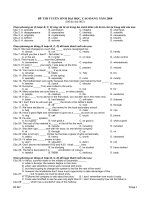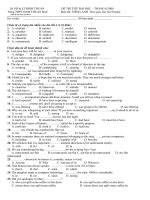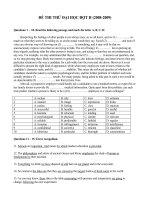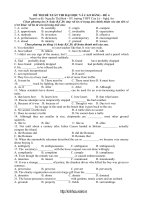đề thi thử đại học môn tiếng anh
Bạn đang xem bản rút gọn của tài liệu. Xem và tải ngay bản đầy đủ của tài liệu tại đây (220.46 KB, 6 trang )
Trang 1/6 – Mã đề thi 123
HỘI HỌC SINH, SINH VIÊN CHUYÊN ANH
(Gifted Students of English Group)
ĐỀ THI THỬ
(Đề thi có 6 trang)
ĐỀ THI THỬ TUYỂN SINH ĐẠI HỌC NĂM 2014
Môn : TIẾNG ANH (Khối A1/ D)
Thời gian làm bài: 90 phút
Mã đề thi 123
Họ, tên thí sinh:
Số báo danh:
ĐỀ THI GỒM 80 CÂU (TỪ QUESTION 1 ĐẾN QUESTION 80)
Mark the letter A, B, C or D on your answer sheet to indicate the word that differs from the rest in the
position of the main stress in each of the following questions.
Question 1: A. delicious B. emphatic C. electrician D. dynamic
Question 2: A. preferential B. intelligent C. potential D. apprentice
Question 3: A. redundant B. relevant C. consultant D. descendant
Mark the letter A, B, C or D on your answer sheet to indicate the word whose underlined part differs
from the other three in pronunciation.
Question 4: A. explanation B. acronym C. addition D. adventure
Question 5: A. flush B. crush C. rush D. push
Mark the letter A, B, C or D on your answer sheet to indicate the correct answer of the following
questions.
Question 6: The Ministry of Defence has been _____ the decision to withdraw from the military action
for the past several months.
A. writing down B. pulling away C. shutting off D. holding up
Question 7: A: “This grammar test is the hardest one we’ve ever had this semester.”
B: “_____”.
A. I couldn’t disagree more, B. I understand what you’re saying,
C. You’re right, D. I don’t see it in that way,
Question 8: Cheese and spinach pie is a traditional Greek _____.
A. cuisine B. food C. course D. dish
Question 9: They had the swamp _____ last year.
A. drain B. to drain C. cut D. to cut
Question 10: When you do something, you should _____.
A. turn over a new leaf B. go down well with
C. get through to D. weigh up the pros and cons
Question 11: _____ changed a lot in the last 30 years.
A. Life has B. A life has C. The life has D. Lives have
Question 12: _____ resigned, we would have been forced to sack him.
A. Had he not B. Had not he C. He had not D. He not had
Question 13: I’d really recommend you _____ the new Jim Carrey film as it’s absolutely hilarious! I
couldn’t stop _____ all the way through.
A. seeing – to laugh B. to see – laughing
C. having seen - laugh D. see – to be laughing
Question 14: I couldn’t come to the party because I _____ go to work.
A. will have to B. have got C. have D. had to
Question 15: She hates those who are not _____ for appointment. She doesn’t want to wait.
A. punctually B. punctual C. punctuality D. punctuate
Question 16: She hates those who are not _____ for appointment. She doesn’t want to wait.
A. twice as higher as that B. twice as high as that of
C. as much as twice of D. as twice much as
Question 17: The food _____ I like best of all is pie alamonde.
A. who B. of which C. that D. whom
Trang 2/6 – Mã đề thi 123
Question 18: The top is your colour, but are you sure it _____ you?
A. suits B. fits C. matches D. goes
Question 19: Suddenly, someone shouted, “Thief!” and the man quickly _____ on a motorbike.
A. made off B. came forward C. took in D. handed in
Question 20: John: “Do you think that we should use public transport to protect our environment?”
Laura: “_____”.
A. There’s no doubt about it B. Of course not. You bet
C. Well, that’s very surprising D. Yes, it’s an absurd idea
Question 21: A large number of workmen _____ because of the economic recession.
A. have laid down B. has laid aside
C. have been laid off D. have been laid out
Question 22: Everyone laughed when he took _____ the teacher so well.
A. over B. up C. off D. out
Question 23: Please don’t forget _____ your essays during Friday’s lesson.
A. handing in B. to hand in C. hand in D. to handing in
Question 24: He is a very intelligent boy; _____, he sometimes gets bad marks.
A. otherwise B. thus C. so D. however
Question 25: Books and magazines _____ around made his room very untidy.
A. that lie B. laying C. which lied D. laying
Question 26: A: “Help yourself with some chicken.”
B: “_____”.
A. Thank you B. Never mind
C. No, I don’t like chicken D. Yes, I will
Question 27: Tony didn’t study hard for the test. His answers _____ from someone else.
A. would have copied B. should have copied C. must have copied D. can have copied
Question 28: This city has four millions _____.
A. residents B. inhabitants C. dwellers D. settlers
Question 29: More than five thousand people _____ in the earthquake in Indonesia last year.
A. was said to have died B. were said to die
C. were said to be died D. was said to be died
Question 30: A: “You’re a great dancer. I wish I could do half as well as you.”
B: “_____ I’m an awful dancer!”
A. You’re too kind. B. That’s a nice compliment!
C. You’ve got to be kidding! D. Oh, thank you very much.
Mark the letter A, B, C or D on your answer sheet to show the underlined part that needs correction in
each of the following questions.
Question 31: The medical problems of parents and their children tend to be very similar to because of
A B C D
the hereditary nature of many diseases.
Question 32: Scholars of historical change feel that the velocity of history has been fastly accelerated by
A B C
the onward rush of science and technology during the twentieth century.
D
Question 33: A lot of people stop smoking because they are afraid their health will be affected and
A B C
early death.
D
Question 34: Mosquitoes usually lay eggs on top stagnant water.
A B C D
Question 35: A food addictive is any chemical that food manufactures intentional add to their products.
A B C D
Mark the letter A, B, C or D on your answer sheet to indicate the word or phrase that is CLOSEST in
meaning to the underlined part in each of the following questions.
Trang 3/6 – Mã đề thi 123
Question 36: He’s such a(n) affable fellow that people sometimes take advantage of him.
A. accessible B. good - natured C. wealthy D. weak
Question 37: If you cannot get to work on time, I shall have to dispense with your services.
A. disperse B. do without C. charge for D. time
Question 38: The twentieth century saw a rapid rise in life expectancy due to improvements in public
health, nutrition and medicine.
A. expectation B. prospect C. anticipation D. span
Mark the letter A, B, C or D on your answer sheet to indicate the word or phrase that is OPPOSITE in
meaning to the underlined part in each of the following questions.
Question 39: The housing market has been very sluggish in the past few years.
A. sanguine B. flourishing C. slow D. weak
Question 40: A chronic lack of sleep may make us irritable and reduces our motivation to work.
A. uncomfortable B. responsive C. calm D. miserable
Read the following passage and mark the letter A, B, C or D in your answer sheet to choose the word
or phrase that best fits each of the numbered blanks.
THE CHOCOLATE FACTORY
Would you like a job where you could eat chocolate (41) _____ day? Well, such a job does exist!
Did you know that most chocolate factory (42) _____ chocolate tasters? Their job is to taste the chocolate
while it is being (43) _____ and say if it is too sweet or too bitter. You have to be very good at tasting
different (44) _____ and you have to comment on (45) _____ the chocolate feels as well. Is it smooth or
crunchy? Unfortunately, you can't just go along and say you like chocolate - that, I'm afraid, is not
enough! Most chocolate tasters have a degree (46) _____ food technology and you will not be able to
work (47) _____ you have had lots of training. Then you have to go through several (48) _____ before
you can be selected. If you think you would be good at chocolate tasting then try to develop your taste
buds by tasting different chocolate (49) _____ blindfold. See if you can tell what type of chocolate it is. If
you get a job like this, you will not be well-paid but most tasters enjoy thier job so much that (50) _____
is not very important.
Question 41: A. whole B. all C. entire D. each
Question 42: A. employ B. use C. utilize D. rent
Question 43: A. carried out B. done C. made D. fabricated
Question 44: A. scents B. odours C. smells D. flavours
Question 45: A. what B. why C. how D. if
Question 46: A. of B. about C. on D. in
Question 47: A. when B. until C. although D. after
Question 48: A. experiments B. trials C. tests D. exams
Question 49: A. bars B. sticks C. rods D. pieces
Question 50: A. income B. payment C. wage D. pay
Read the following passage and mark the letter A, B, C or D in your answer sheet to indicate the
correct answer to each of the questions.
Today we take electricity for granted and perhaps we do not realize just how useful this discovery
has been. Steam was the first invention that replaced wind power. It was used to drive engines and was
passed through pipes and radiators to warm rooms. Petrol mixed with air was the next invention that
provided power. Exploded in a cylinder, it drove a motor engine. Beyond these simple and direct uses,
those forms have not much adaptability. On the other hand, we make use of electricity in thousands of
ways. From the powerful voltages that drive our electric trains to the tiny current needed to work a simple
calculator, and from the huge electric magnet in steel works that can lift 10 tons to the tiny electric
magnet in a doorbell, all are powered by electricity. An electric current can be made with equal ease to
heat a huge mass of molten metal in a furnace, or to boil a jug for a cup of coffee. Other than atomic
energy, which has not as yet been harnessed to the full, electricity is the greatest power in the world. It is
flexible, and so adaptable for any task for which it is wanted. It travels so easily and with incredible speed
along wires or conductors that it can be supplied instantly over vast distances. To generate electricity,
huge turbines or generators must be turned. In Australia they use coal or water to drive this machinery.
Trang 4/6 – Mã đề thi 123
When dams are built, falling water is used to drive the turbines without polluting the atmosphere with
smoke from coal. Atomic power is used in several countries but there is always the fear of an accident. A
tragedy once occurred at Chernobyl, in Ukraine, at an atomic power plant used to make electricity. The
reactor leaked, which caused many deaths through radiation. Now scientists are examining new ways of
creating electricity without harmful effects to the environment. They may harness the tides as they flow
in and out of bays. Most importantly, they hope to trap sunlight more efficiently. We do use solar heaters
for swimming pools but as yet improvement in the capacity of the solar cells to create more current is
necessary. When this happens, electric cars will be viable and the world will rid itself of the toxic gases
given off by trucks and cars that burn fossil fuels.
Question 51: The author mentions the sources of energy such as wind, steam, petrol in the first paragraph
to _____.
A. suggest that electricity should be alternated with safer sources of energy
B. emphasize the usefulness and adaptability of electricity
C. imply that electricity is not the only useful source of energy
D. discuss which source of energy can be a suitable alternative to electricity
Question 52: Before electricity, what was sometimes passed through pipes to heat rooms?
A. gas B. petrol C. steam D. hot wind
Question 53: What does the author mean by saying that electricity is flexible?
A. It is cheap and easy to use. B. It is used to drive motor engines.
C. It can be adapted to various uses. D. It can be made with ease.
Question 54: What do we call machines that make electricity?
A. Voltages B. Electric magnets
C. Generators or turbines. D. Pipes and radiators
Question 55: The main forms of power used to generate electricity in Australia are _____.
A. atomic power and water B. water and coal
C. sunlight and wind power D. wind and gas
Question 56: The word "they" in the last paragraph refers to _____.
A. harmful effects B. the tides C. scientists D. new ways
Question 57: Electric magnets are used in steel works to _____.
A. lift heavy weights up to ten tons B. test the steel for strength
C. heat the molten steel D. boil a jug of water
Question 58: The advantage of harnessing the power of the tides and of sunlight to generate electricity is
that they ______
A. do not pollute the environment B. are more reliable
C. are more adaptable D. do not require attention
Question 59: Which of the following power sources causes pollution by emitting harmful gases?
A. sunlight B. petrol C. water D. wind
Question 60: The best title for this passage could be _____.
A. “Types of Power Plants” B. “Electricity: Harmful Effects on Our Life”
C. “How to Produce Electricity” D. “Why Electricity Is So Remarkable”
Mark the letter A, B, C or D on your answer sheet to indicate the sentence that is CLOSEST in
meaning to the sentence given in each of the following questions.
Question 61: This material is suitable for students of eighteen years and up.
A. Students of eighteen years and over can use this material.
B. The material is suitable for students who are over eighteen.
C. The material may be suitable for students of over eighteen years of age.
D. Only 18-year-old students will find this material suitable.
Question 62: I wasn’t early enough to find anyone at home awake.
A. I didn’t expect to find anyone awake when I got home.
B. When I got home, I found everyone awake, waiting for me.
C. When I got home late, I used to find my family sleeping.
D. By the time I arrived home, everyone had gone to sleep.
Trang 5/6 – Mã đề thi 123
Question 63: You could not have made a very good impression on them.
A. You seem to have impressed them very unfavourably.
B. It’s impossible that the effect you made on them was particularly positive.
C. Something appears to have made them think you are unsuitable.
D. You should have tried to make them think well of you.
Question 64: The government does not know what to do with household rubbish in large cities.
A. Little does the government know what to do with household rubbish in large cities.
B. It is unknown what to do with household rubbish in large cities by the government
C. Rarely the government knows what to do with household rubbish in large cities.
D. Hardly any government knows what to do with household rubbish in large cities.
Question 65: You can rely on Pat to give you any help you may need.
A. If you need of any kind, be sure to let Pat know.
B. Let Pat know if you need any help with this.
C. Pat is the one to ask if you find you require any assistance.
D. Should you require any assistance, you can count on Pat for it.
Mark the letter A, B, C, or D to indicate the best sentence built from the given words or phrases.
Question 66: when 1/ airport/ plane/ already/ leave.
A. When I arrived the airport, the plane had already left.
B. When I got to the airport, the plane had already left.
C. When I reached at the airport, the plane already left.
D. When I came the airport, the plane had already left.
Question 67: If/ weather/ fine/ an excursion/ tomorrow.
A. If the weather will be fine, we will go on an excursion tomorrow.
B. If the weather is fine, we will go on an excursion tomorrow.
C. If the weather is fine, we would go on an excursion tomorrow.
D. If the weather were fine, we would go on an excursion tomorrow.
Question 68: She/ not alone/ when/ shopping/ yesterday.
A. She was not alone when she did shopping yesterday.
B. She is not alone when she go shopping yesterday.
C. She was not alone when she went shopping yesterday.
D. She had not been alone when she went shopping yesterday
Question 69: a pity/ wish/ tell/ about/ this.
A. What a pity! I wish you had told us about this.
B. What a pity! I wish you told us about this.
C. What a pity! I wish you would tell us about this.
D. What a pity! I wish you have told us about this.
Question 70: Only/ this way/ make/ laws/ effective.
A. Only by this way we can make our laws effective.
B. Only this way we can make our laws effective.
C. Only by this way can we make our laws effective.
D. Only by this way can we make it effective our laws.
Read the following passage and mark the letter A, B, C or D in your answer sheet to indicate the
correct answer to each of the questions.
Experiments have shown that in selecting personnel for a job, interviewing is at best a hindrance,
and may even cause harm. These studies have disclosed that the judgments of interviewers differ
markedly and bear little or no relationship to the adequacy of the job applicants. Of the many reasons why
this should be the case, three in particular stand out.
The first reason is related to an error of judgment known as the halo effect. If a person has one
noticeable good trait , their other characteristics will be judged as better than they really are. Thus, an
individual who dresses smartly and shows self-confidence is likely to be judged capable of doing a job
well regardless of his or her real ability.
Trang 6/6 – Mã đề thi 123
Interviewers are also prejudiced by an effect called the primacy effect. This error occurs when
interpretation of later information is distorted by earlier connected information. Hence, in an interview
situation, the interviewer spends most of the interview trying to confirm the impression given by the
candidate in the first few moments. Studies have repeatedly demonstrated that such an impression is
unrelated to the aptitude of the applicant.
The phenomenon known as the contrast effect also skews the judgment of interviewers. A suitable
candidate may be underestimated because he or she contrasts with a previous one who appears
exceptionally intelligent. Likewise, an average candidate who is preceded by one who gives a weak
showing may be judged as more suitable than he or she really is.
Since interviews as a form of personnel selection have been shown to be inadequate, other
selection procedures have been devised which more accurately predict candidate suitability. Of the
various tests devised, the predictor which appears to do this most successfully is cognitive ability as
measured by a variety of verbal and spatial tests.
Question 71: The word “they” in line 6 refers to _____.
A. applicants B. judgments C. interviewers D. characteristics
Question 72: The word “this” in line 20 refers to _____.
A. measure cognitive ability B. devise personnel selection
C. predict candidate suitability D. devise accurate tests
Question 73: This passage mainly discusses the _____.
A. Judgments of interviewers concerning job applicants.
B. Inadequacy of interviewing job applicants.
C. Effects of interviewing on job applicants.
D. Techniques that interviewers use for judging job applicants.
Question 74: According to the passage, the hallo effect _____.
A. exemplifies how one good characteristic color perceptions
B. takes effect only when a candidate is well - dressed
C. stands out as the worst judgmental error
D. helps the interviewer’s capability to judge real ability
Question 75: The word “hindrance” in line 1 is closest in meaning to _____.
A. assistance B. encouragement C. procedure D. interference
Question 76: According to the passage the first impression _____.
A. can easily be altered
B. is unrelated to the interviewer’s prejudices
C. is the one that stays with the interviewer
D. has been repeatedly demonstrated to the applicant
Question 77: The word “skews” in line 14 is closest in meaning to _____.
A. improves B. opposes C. biases D. distinguishes
Question 78: The author mentions all of the following reasons why interviewing is not an accurate way
to predict candidate suitability EXCEPT the _____.
A. primacy effect B. halo effect C. contrast effect D. cognitive effect
Question 79: The word “confirm” in line 11 is closest in meaning to _____.
A. verify B. misrepresent C. recollect D. conclude
Question 80: The paragraphs following the passage most likely discuss which of the following?
A. More information on the kinds of judgmental effects
B. Other reasons for misjudgments of applicants
C. Other selection procedures included in interviewing
D. More information on cognitive ability tests
THE END









